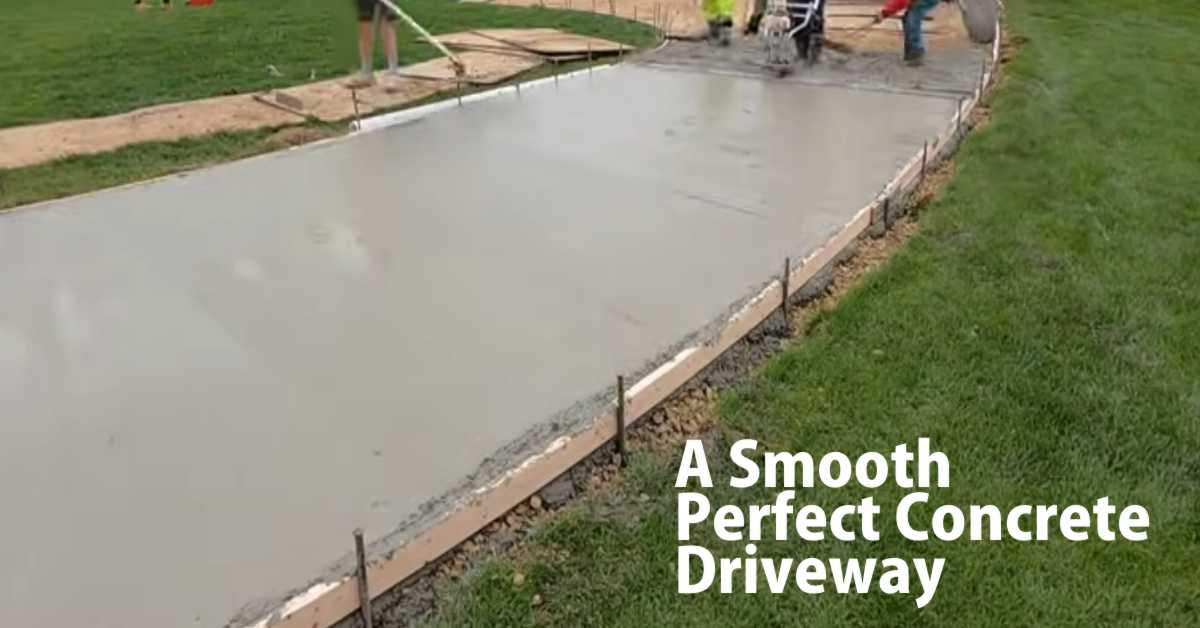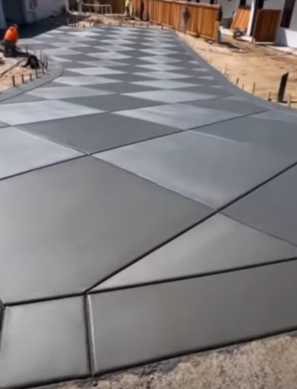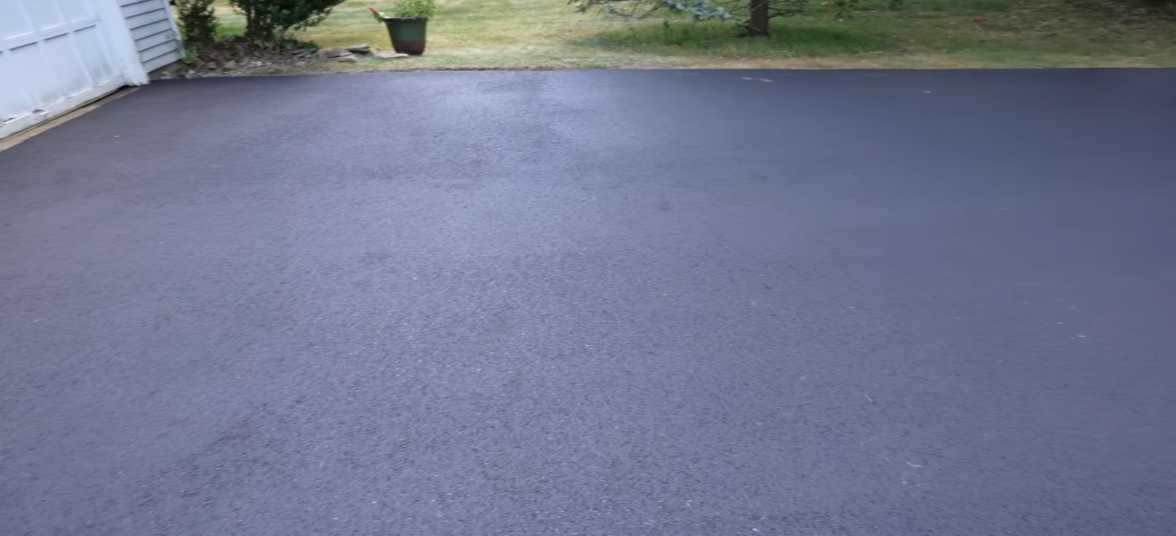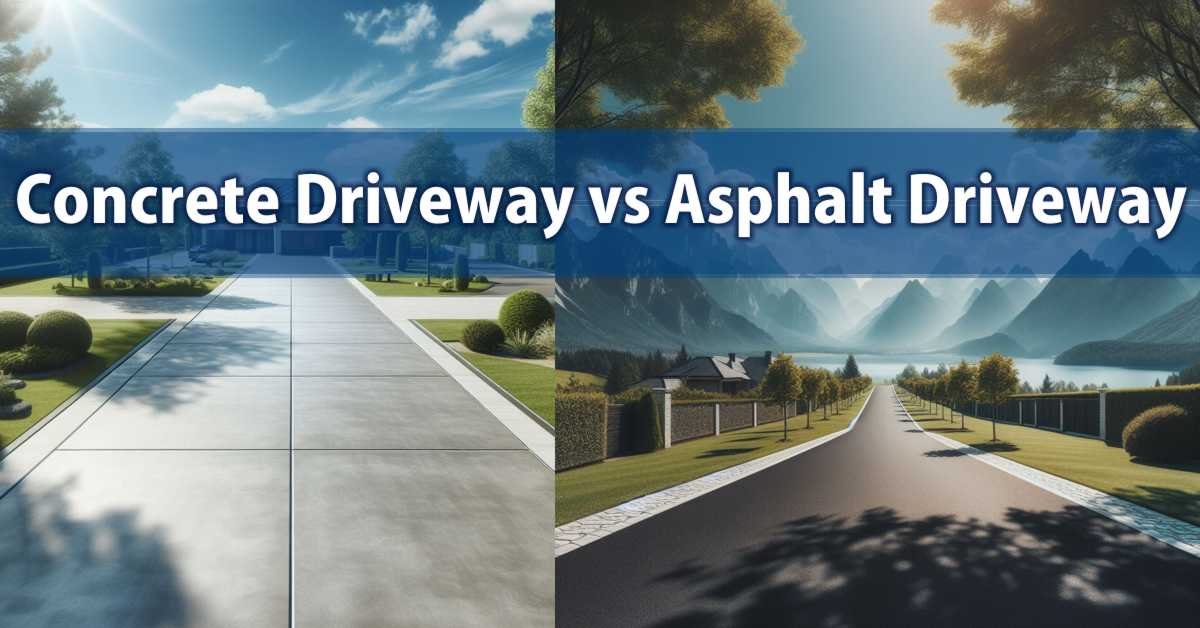A well-designed driveway enhances your home’s curb appeal and serves as a functional pathway for vehicles. When it comes to choosing the material for your driveway, the two most popular options are concrete and asphalt. This article aims to comprehensively compare these two materials, considering factors such as cost, durability, maintenance, and environmental impact, to help you make an informed decision.
As a licensed civil engineer and construction specialist with over 25 years of experience in asphalt materials, specifications, and roadway construction, I understand the importance of making informed decisions regarding driveway materials. Whether you’re building a new home or renovating an existing property, the choice between a concrete driveway and an asphalt driveway can have significant implications for both the short and long term.
Concrete driveways offer superior durability and aesthetic appeal but come with a higher initial cost. Asphalt driveways, on the other hand, are more budget-friendly but may require more maintenance and have a shorter lifespan.
Important points to consider while comparing Concrete Driveway vs Asphalt Driveway
- Carefully evaluate your budget, lifestyle, and long-term goals to determine the best driveway material for your needs.
- Consider the initial installation costs, as well as the long-term maintenance and repair costs associated with each material.
- Assess the durability, weather resistance, and aesthetic appeal of concrete and asphalt driveways based on your local climate and personal preferences.
- Factor in the potential impact on resale value and overall property value when making your decision.
- Understand the installation, repair, and maintenance requirements for both materials to ensure proper upkeep and longevity.
- Explore customization and design options to create a driveway that complements the style and architecture of your property.
How Concrete Driveways are made?
Concrete is a versatile and durable material composed of cement, water, and aggregates like sand and gravel. Installing a concrete driveway involves several steps, including:
Preparing the sub-base:
The area is excavated and graded, ensuring proper drainage and compaction of the soil.
Pouring and finishing:
Concrete is poured and leveled, followed by finishing techniques like brooming or stamping to achieve the desired texture and appearance.
Curing:
The concrete is allowed to cure for several days to achieve its full strength.
Concrete driveways offer a range of finishing options, such as stamped patterns, exposed aggregate, or stained surfaces, allowing homeowners to customize the look to match their preferences.
Cost Comparison Concrete Driveway vs. Asphalt Driveway
When it comes to installing a new driveway, homeowners often find themselves torn between the choice of concrete or asphalt. Both materials have their pros and cons, and the decision ultimately boils down to factors such as cost, durability, and personal preference. Now we will discuss the cost differences between concrete and asphalt driveways, shedding light on the various factors that influence the final price tag.
Factors Affecting Driveway Cost
Material Cost
The primary factor influencing the cost of a driveway is the material itself. Concrete is generally more expensive than asphalt on a per-square-foot basis. However, the exact cost can vary depending on the quality of the materials and the location.
Labor Cost
The installation process for both concrete and asphalt driveways requires skilled labor. The complexity of the job, including site preparation, grading, and finishing, can impact labor costs. Generally, concrete driveways require more specialized labor, which can drive up the overall cost.
Driveway Size and Design
The larger the driveway, the higher the cost, regardless of the material used. Additionally, intricate designs, patterns, or textures can increase the cost of both concrete and asphalt driveways due to the additional labor and materials required.
Average Cost Breakdown
As a licensed civil engineer and construction specialist with over 25 years of experience in the field of asphalt materials, specifications, and roadway construction, I can provide you with an accurate cost estimation for both concrete and asphalt driveways.
Concrete Driveway Cost
The average cost of a concrete driveway can range from $3 to $10 per square foot. This variation in pricing is influenced by factors such as the location, quality of materials used, and the complexity of the design. For a standard 16×20 foot driveway, you can expect to pay between $960 and $3,200.
Asphalt Driveway Cost
Asphalt driveways are generally more affordable than concrete, with an average cost ranging from $2 to $6 per square foot. For the same 16×20 foot driveway, the cost would be between $640 and $1,920.
It’s important to note that these are generalized estimates, and the actual cost may vary depending on your specific project requirements and local market conditions. However, these ranges can serve as a helpful starting point for budgeting purposes.
Cost Comparison Table
| Driveway Size | Concrete Cost | Asphalt Cost |
|---|---|---|
| 10×20 ft | 600−2,000 | 400−1,200 |
| 16×20 ft | 960−3,200 | 640−1,920 |
| 20×24 ft | 1,440−4,800 | 960−2,880 |
Long-Term Considerations
Maintenance
While concrete driveways generally require less maintenance than asphalt, they can develop cracks over time due to settling or freeze-thaw cycles. Asphalt driveways may require periodic sealing and resurfacing, which can add to the long-term cost.
Durability
Concrete is known for its superior durability, typically lasting 25-30 years with proper maintenance. Asphalt driveways have a shorter lifespan, typically lasting 15-20 years before requiring replacement.
Resale Value
A well-maintained concrete driveway can potentially add more value to a property compared to an asphalt driveway, as it is often perceived as a more premium and long-lasting option.
As a licensed civil engineer and construction specialist with over 25 years of experience, I can attest to the fact that a well-maintained concrete driveway can potentially add more value to a property compared to an asphalt driveway. This is because concrete driveways are often perceived as a more premium and long-lasting option. Allow me to explain it further:
I have worked on numerous residential and commercial projects throughout my career, and I have witnessed firsthand the impact that a well-constructed and maintained driveway can have on a property’s value. Concrete driveways, in particular, are highly regarded for their durability and longevity. When properly installed and maintained, a concrete driveway can last for 25 to 30 years or even longer. This longevity is a significant selling point for homebuyers and investors, as it represents a long-term investment in the property’s infrastructure and curb appeal.

Additionally, concrete driveways offer a wide range of design options, such as stamped patterns, exposed aggregate finishes, and various colors and textures. These design elements can enhance the aesthetic appeal of a property, making it more attractive to potential buyers and increasing its perceived value.
In contrast, asphalt driveways, while more affordable initially, typically have a shorter lifespan of 15 to 20 years and may require more frequent maintenance, such as seal coating and resurfacing. This can be perceived as a drawback by some homebuyers, who may view it as an additional expense and hassle.
Furthermore, when it comes to resale, potential buyers often perceive concrete driveways as a premium feature that adds value to a property. They may view it as a sign of quality construction and a long-lasting investment, which can make the property more appealing in a competitive real estate market.
Of course, it’s important to note that the actual resale value of a property depends on various factors, including location, market conditions, and the overall condition of the home. However, a well-maintained concrete driveway can undoubtedly be a selling point and contribute to the perceived value of a property.
My Personal Preference
Aesthetic Appeal
Concrete driveways offer more versatility in terms of design and color options, allowing homeowners to create a unique and visually appealing driveway that complements their home’s aesthetic. Asphalt, on the other hand, has a more uniform and traditional appearance. You can learn more about decorating concrete in this guide.
Environmental Impact
While both concrete and asphalt have environmental implications during production and installation, asphalt driveways generally have a lower carbon footprint than concrete driveways due to the energy-intensive process of cement production.
What to know at the start?
When deciding between a concrete or asphalt driveway, consider your budget, long-term goals, and personal preferences. While concrete driveways are more expensive up front, they offer superior durability and the potential for increased resale value. Asphalt driveways are a more cost-effective option but may require more maintenance and have a shorter lifespan. Ultimately, the decision should be based on your specific needs and priorities.
I am a licensed civil engineer and construction specialist with over 25 years of experience in the field of asphalt materials, specifications, and roadway construction. My expertise stems from working on numerous large-scale infrastructure projects, where I have honed my skills in designing and overseeing the installation of both concrete and asphalt driveways, parking lots, and roadways.
Durability and Lifespan
Concrete Durability
Concrete is known for its exceptional durability and resistance to various environmental factors, including temperature fluctuations, moisture, and UV exposure. A well-constructed concrete driveway can last for decades with proper maintenance, making it a long-lasting investment.
Asphalt Durability
While asphalt driveways are also durable, they are more susceptible to cracking, pitting, and other forms of deterioration over time. Factors such as heavy vehicle traffic, freeze-thaw cycles, and exposure to petroleum-based substances can accelerate the aging process of asphalt.
Data Table: Durability and Lifespan
| Factor | Concrete Driveway | Asphalt Driveway |
|---|---|---|
| Expected Lifespan | 30-50 years | 15-25 years |
| Resistance to Cracking | High | Moderate |
| Resistance to Fading | High | Moderate |
| Resistance to Staining | High | Low |
Aesthetics and Curb Appeal
Concrete Aesthetics
Concrete driveways offer a wide range of aesthetic options, including various colors, textures, and patterns. Stamped or stained concrete can mimic the look of brick, stone, or other materials, providing a unique and visually appealing appearance that can enhance the curb appeal of your property.

Asphalt Aesthetics
Asphalt driveways, on the other hand, have a more uniform and utilitarian appearance. While they can be attractive when freshly paved, their appearance can deteriorate over time due to fading, cracking, and other forms of wear and tear.

Data Table: Aesthetic Considerations
| Factor | Concrete Driveway | Asphalt Driveway |
|---|---|---|
| Color Options | Wide range | Limited |
| Texture Options | Various finishes | Smooth surface |
| Customization | High | Low |
| Curb Appeal | High | Moderate |
Climate and Weather Considerations
Concrete in Extreme Weather
Concrete driveways are generally more resistant to extreme weather conditions, such as extreme heat or cold temperatures. However, in areas with frequent freeze-thaw cycles, proper installation and curing techniques are crucial to prevent cracking and premature deterioration.
Asphalt in Extreme Weather
Asphalt driveways can be more susceptible to damage from extreme weather conditions. High temperatures can cause softening and rutting, while cold temperatures can make the material brittle and prone to cracking. Additionally, snow and ice removal can be more challenging on asphalt surfaces.
Data Table: Weather Considerations
| Factor | Concrete Driveway | Asphalt Driveway |
|---|---|---|
| Heat Resistance | High | Moderate |
| Cold Resistance | High | Moderate |
| Freeze-Thaw Resistance | Moderate | Low |
| Snow/Ice Removal | Easier | More Challenging |
Environmental Impact
Concrete and Sustainability
Concrete driveways have a relatively high carbon footprint due to the energy-intensive manufacturing process of cement, a key component of concrete. However, concrete is a durable and long-lasting material, which can help offset its environmental impact over its lifespan.
Asphalt and Sustainability
Asphalt driveways have a lower carbon footprint during production, as they are primarily made from recycled materials, such as crushed stone and reclaimed asphalt. However, their shorter lifespan and the need for periodic resurfacing can contribute to higher overall environmental impact over time.
Data Table: Environmental Impact
| Factor | Concrete Driveway | Asphalt Driveway |
|---|---|---|
| Carbon Footprint | Higher | Lower |
| Recyclability | Moderate | High |
| Embodied Energy | Higher | Lower |
| Overall Sustainability | Moderate | Moderate |
Installation and Repair Considerations
Concrete Installation and Repair
Installing a concrete driveway requires proper site preparation, formwork, and curing processes. While the installation process can be more labor-intensive and time-consuming, concrete repairs, if needed, are generally more straightforward and localized.
Asphalt Installation and Repair
Asphalt driveway installation is typically faster and less labor-intensive than concrete. However, repairs can be more challenging and may require resurfacing larger areas to maintain a consistent appearance.
Data Table: Installation and Repair
| Factor | Concrete Driveway | Asphalt Driveway |
|---|---|---|
| Installation Time | Longer | Shorter |
| Site Preparation | More Extensive | Less Extensive |
| Repair Complexity | Lower | Higher |
| Seamless Repairs | Easier | More Challenging |
Resale Value and Property Value
Concrete and Property Value
A well-maintained concrete driveway can positively impact the resale value and overall perceived value of a property. Concrete driveways are often seen as a long-term investment and a selling point for potential buyers.
Asphalt and Property Value
While asphalt driveways can also contribute to property value, their impact may be less significant than concrete driveways, particularly if they show signs of wear and tear or require resurfacing.
Data Table: Property Value Impact
| Factor | Concrete Driveway | Asphalt Driveway |
|---|---|---|
| Perceived Value | Higher | Moderate |
| Curb Appeal | Higher | Moderate |
| Resale Value Impact | Higher | Moderate |
Maintenance and Upkeep
Concrete Maintenance
Concrete driveways require relatively low maintenance, primarily consisting of occasional cleaning and sealing to protect the surface from stains, moisture, and freeze-thaw damage. Minor cracks or chips can be repaired with concrete patching compounds.
Asphalt Maintenance
Asphalt driveways require more frequent maintenance, including periodic resurfacing, sealing, and crack repair. Proper maintenance is crucial to extend the lifespan of an asphalt driveway and prevent further deterioration.
Data Table: Maintenance Requirements
| Factor | Concrete Driveway | Asphalt Driveway |
|---|---|---|
| Cleaning | Regular | Regular |
| Sealing | Every 3-5 years | Every 1-2 years |
| Resurfacing | Not required | Every 5-10 years |
| Crack Repair | Occasional | Regular |
Accessibility and Special Needs
Concrete and Accessibility
Concrete driveways offer excellent accessibility for individuals with mobility challenges or special needs. They provide a smooth and level surface, making it easier for wheelchairs, walkers, or other mobility aids to navigate.
Asphalt and Accessibility
While asphalt driveways can also be accessible, they are more prone to developing uneven surfaces, cracks, or potholes over time, which can create obstacles for those with mobility challenges.
Data Table: Accessibility Considerations
| Factor | Concrete Driveway | Asphalt Driveway |
|---|---|---|
| Surface Evenness | High | Moderate |
| Slip Resistance | High | Moderate |
| Wheelchair/Walker Accessibility | Excellent | Good |
| Visibility for Low Vision | Good | Good |
Customization and Design Options
Concrete Design Options
Concrete driveways offer a wide range of customization and design options, allowing homeowners to create unique and visually appealing driveways that complement the overall style and architecture of their property. Decorative elements, such as stamped patterns, stains, or exposed aggregate finishes, can add character and enhance curb appeal.
Asphalt Design Options
Asphalt driveways, on the other hand, have more limited design options. While different colors and patterns can be achieved through staining or stamping techniques, the overall aesthetic possibilities are more restrictive compared to concrete.
Data Table: Design and Customization Options
| Factor | Concrete Driveway | Asphalt Driveway |
|---|---|---|
| Color Options | Wide range | Limited |
| Pattern Options | Stamped, exposed aggregate | Stamped, stained |
| Texture Options | Smooth, broom-finished, etc. | Smooth |
| Customization Potential | High | Low |
Important Questions
How long does a concrete driveway last?
A properly installed and maintained concrete driveway can last between 25 and 30 years, making it a long-lasting investment for your home.
Is it possible to resurface an existing asphalt driveway?
Yes, it is possible to resurface an existing asphalt driveway by applying a new layer of asphalt over the existing surface. This can be a cost-effective way to extend the life of your driveway.
Can I install a driveway myself?
While it is possible to install a driveway yourself, it is generally recommended to hire professional contractors who have the necessary experience and equipment to ensure a proper installation.
How long does it take to install a concrete driveway?
The installation time for a concrete driveway can vary depending on the size and complexity of the project, but it typically takes several days to complete, including time for curing.
Can I enhance the appearance of a concrete driveway?
Yes, there are various options to enhance the appearance of a concrete driveway, such as adding color, stamping patterns, or applying decorative coatings.
How often should I seal an asphalt driveway?
It is generally recommended to seal an asphalt driveway every 2-3 years to protect it from weathering and extend its lifespan.
Can I install a heated driveway system?
Yes, both concrete and asphalt driveways can be equipped with heated systems to melt snow and ice during the winter months. This option typically adds to the overall cost.
Can I repair cracks in a concrete driveway?
Minor cracks in a concrete driveway can be repaired using concrete patching compounds or epoxy fillers. However, larger cracks may require more extensive repairs or replacement.
How can I reduce the cost of a driveway installation?
To reduce the cost of a driveway installation, consider using standard materials and designs, and potentially doing some of the preparatory work yourself, such as grading or excavation (if permitted).
Is it possible to install a driveway over an existing surface?
In some cases, it may be possible to install a new driveway over an existing surface, such as an old concrete or asphalt driveway. However, this will depend on the condition of the existing surface and may require additional preparation work.
How can I ensure proper drainage for my driveway?
Proper drainage is essential to prevent water from pooling on your driveway and causing damage. This can be achieved through proper grading, installation of drainage systems, and the use of permeable materials (if applicable).
Which driveway material is more cost-effective in the long run?
While asphalt driveways typically have a lower initial installation cost, concrete driveways tend to be more cost-effective in the long run due to their longer lifespan and lower maintenance requirements.
Can I install a concrete driveway myself, or is professional installation recommended?
While it is possible to install a concrete driveway as a DIY project, professional installation is highly recommended to ensure proper site preparation, concrete mixing and placement, and curing processes. Improper installation can lead to cracking, premature deterioration, and potential safety issues.
How often should I reseal or resurface my asphalt driveway?
Asphalt driveways typically require resealing every 1-2 years and resurfacing every 5-10 years, depending on usage, weather conditions, and maintenance practices.
Can I change the color or texture of an existing concrete driveway?
Yes, there are various techniques available to change the color or texture of an existing concrete driveway, such as staining, stamping, or resurfacing with decorative overlays. However, these processes may require professional assistance and can add to the overall cost.
Is it possible to install a heated driveway system for melting snow and ice?
Yes, both concrete and asphalt driveways can be equipped with heated driveway systems, which use embedded cables or pipes to melt snow and ice during the winter months. However, these systems can be costly to install and operate.
How do I properly maintain a concrete driveway?
Proper maintenance for a concrete driveway includes regular cleaning to remove dirt, debris, and stains, as well as periodic sealing to protect the surface from moisture and freeze-thaw damage. Repairing cracks or chips promptly is also important to prevent further deterioration.
Can I install a concrete driveway over an existing asphalt driveway?
Yes, it is possible to install a concrete driveway over an existing asphalt surface, provided that the asphalt is in good condition and properly prepared. This can involve removing loose material, leveling the surface, and installing a vapor barrier before pouring the concrete.
How do I choose the right color and texture for a decorative concrete driveway?
When choosing the color and texture for a decorative concrete driveway, consider the architectural style of your home, the surrounding landscape, and your personal preferences. It’s also advisable to view samples or mock-ups to ensure you achieve the desired aesthetic.
Can I install a permeable driveway system to improve drainage and reduce runoff?
Yes, both concrete and asphalt driveways can be designed as permeable systems, which allow water to drain through the surface and into the ground below. This can help reduce runoff and improve stormwater management but may require additional installation considerations and maintenance.
How long does it typically take to install a concrete driveway?
The installation time for a concrete driveway can vary depending on the size and complexity of the project but typically ranges from several days to a week or more. Factors such as site preparation, concrete curing time, and any decorative finishes can affect the overall timeline.
Can I use a concrete driveway for commercial or heavy-duty applications?
Yes, concrete driveways are suitable for commercial or heavy-duty applications, provided that the concrete mix design, reinforcement, and thickness are properly engineered to support the anticipated loads and traffic. Professional installation and ongoing maintenance are crucial for these applications.
Disclaimer:
It’s important to note that these are generalized estimates, and the actual cost may vary depending on your specific project requirements and local market conditions. However, these ranges can serve as a helpful starting point for budgeting purposes.
